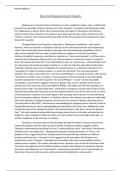Phoebe Williams
Discuss how Shakespeare presents Cleopatra.
Shakespeare’s characterisation of Cleopatra can be considered complex; she is multifaceted,
powerful yet vulnerable, lustful yet loving, due to the “tempest” of emotions which fluctuate within
her. Shakespeare is able to achieve this characterisation through her interactions with Anthony,
which contrast to her behaviour in his absence, how others perceive her and her treatment of her
‘inferiors’. However, this characterisation does little to defy the perception that Cleopatra has value
beyond her sexuality.
Through Anthony and Cleopatra’s interactions, Shakespeare establishes a clear power
dynamic, which rests heavily on Cleopatra’s side due to her inherently dominant and tempestuous
nature. She achieves this power imbalance through sexual and emotional manipulation, and it is
often unclear whether this is in order to obtain Anthony’s allegiance or his love. Enobarbus,
Anthony’s insightful companion, describes her emotions as “storms and tempests”, as if they are on
a divine scale and beyond earthly control, yet, when prompted, it seems she is eerily in control of
them. She advises Charmain that “if you find (Anthony) sad, say I am dancing,”, with implication that
she will contrast her mood according to Anthony’s, in order to make him vulnerable and therefore
malleable. Cleopatra also uses her reputation for sexual prowess or, as Benjamin describes it, her
‘reputation for matters in sexual conquest’, to entice and dominate “the never bed wearied”
Anthony. She recalls a story where she “wore his sword Phillipan” in a sexual encounter, after having
“drunk him to his bed”. This is certainly a ‘sexual conquest’ since she preying on the vulnerability
that she manufactured in order to possess “his sword Phillipan”; “sword” not only has phallic
connotations, which further suggests inversion of gender roles, but it is symbolic of his triumvir
identity since this sword was used in the Battle of Phillipa. This battle earnt him his reputation as a
Roman warrior with “eyes like plated Mars” and therefore Cleopatra’s frivolity with an item of such
historical and sentimental value shows how she exploits Anthony’s love for her and uses it as a form
of entertainment. Cleopatra is the active agent in this exchange and her power is so overwhelming
that it emasculates Anthony. However, in Anthony’s absence, the audience can observe a noticeable
shift in her behaviour. Cleopatra becomes more sincere in her love for Anthony, describing him as
“the demi-Atlas of this Earth”, and therefore acknowledging his Sisyphean task as triumvir as well as,
through likening him to a god, reacknowledging the heavenly scale of their love. Additionally, upon
hearing the news of his marriage to Octavia, she asks Charmian to “pity (her)…but do not speak to
(her)”, this level emotional vulnerability has not been shown thus far in the play and therefore the
audience’s view of Cleopatra shifts once again, as it will continue to do so throughout the play, as
another complexity to her character is revealed.
Cleopatra’s characterisation is also developed through how other characters perceive her,
namely the duplicity that the male characters identify. The Roman soldiers struggle to define
Cleopatra, simultaneously describing her to be “o’erpicturing that Venus” and having “transformed
(Anthony) into a strumpets fool,”. Implying that Cleopatra exceeds the beauty of “Venus”, the
goddess of love, suggests that she is a deeply sexual and sensual being, whereas her ability to
transform Anthony into a “strumpet’s fool” suggests that his association with Cleopatra has
devalued him, since “strumpet” is derogatory and condemns the same sexual qualities that the
soldiers seem to admire. This shallow evaluation of her character is due to the fact that these male
characters are judging her by the Madonna-Whore complex. One attempt to evaluate her beyond
this system, describing her as a “royal wench”, is oxymoronic and critical, as it is inconceivable, to
these male characters, that a woman could possess both sophistication and sexuality.




